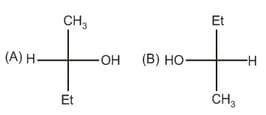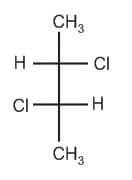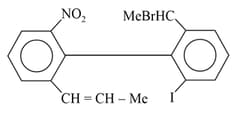Isomerism
Isomerism: Overview
In this topic, we will deal with the concept of isomerism. We will study four types of structural isomerism, chain isomerism, position isomerism, functional group isomerism and metamerism in detail along with stereoisomerism.
Important Questions on Isomerism
When an optically active compound is placed in a 10 dm tube, it is present 20 gm in a 200 mL solution rotates the PPL by 30o. Calculate the angle of rotation and specific angle of rotation if above solution diluted to 1 litre.
Which of the following combinations amongst the four Fischer projections represents the same absolute configurations?




On chlorination of propane, the number of products having the formula is


Which of the above compounds are enantiomers?


Which of the above formula represent identical compounds?
How many stereoisomer of the following molecule are possible? HOOC.CH = C = CH.COOH

The compound with the above configuration is called:
The number of isomers of C3H5Br3 (including stereoisomers):
An optically pure compound X gave an . A mixture of X and its enantiomer Y gave . The ratio of X to Y in the mixture is:
Which of the following statements is true for a pair of diastereomers?
Which of the following sugars has the configuration (2S, 3R, 4R)?
Stereoisomers differ from each other in what respect?
(+) - mandelic acid has a specific rotation of 158o. What would be the observed specific rotation of a mixture of 25% (-) - mandelic acid and 75% (+) - mandelic acid ?
(+) - mandelic acid has a specific rotation of 158o. What would be the observed specific rotation of a mixture of 25% (-) - mandelic acid and 75% (+) - mandelic acid?
Dextrorotatorypinene has a specific rotation . A sample of pinene containing both the enantiomers was found to have a specific rotation value . The percentages of the (+) and (-) enantiomers present in the sample are, respectively.
Dextrorotatorypinene has a specific rotation . A sample of pinene containing both the enantiomers was found to have a specific rotation value . The percentages of the (+) and (-) enantiomers present in the sample are, respectively.
Dextrorotatory pinene has a specific rotation . A sample of pinene containing both the enantiomers was found to have a specific rotation value . The percentages of the (+) and (-) enantiomers present in the sample are, respectively:

Relation between given pair is:
Optical rotation produced by  is 36o then that product by
is 36o then that product by  is
is
How many stereoisomers are possible for the following compound?

